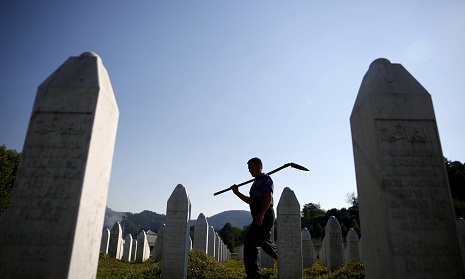Monday’s announcement of the new support for the charity Remembering Srebrenica comes at the start of a week of memorial services across the UK for the more than 8,000 men and boys who were slaughtered when the Bosnian town fell to Serb forces 20 years ago.
The victims were in what was supposed to have been a UN-protected “safe area”, but the Dutch soldiers guarding it were powerless to stop the Serb forces led by Gen Ratko Mladic, who is now on trial in The Hague for genocide. Newly declassified documents confirm that the UK, US and France had made a policy decision two months earlier, in May 1995, to discontinue the use of air strikes to dissuade Serb attacks.
The US and UK also had prior intelligence of the Serb offensive on Srebrenica but did not share it with the Dutch. Some senior members of the Tory foreign policy establishment have described the party as being haunted by the passivity of John Major’s government in the face of the Bosnian atrocities.
“Major’s government effectively colluded with and rewarded the Serb perpetrators of genocide, and I believe many Tories, including the prime minister, do feel an acute sense of shame over that record,” said Marko Attila Hoare, a historian of the former Yugoslavia at Kingston University.
A memorial service marking the 20th anniversary of Srebrenica is to be held in Westminster Abbey on Monday. The prime minister will host a reception in Downing Street for the Bosnian president, Bakir Izetbegovic, and representatives from the Mothers of Srebrenica, a group for those who lost relatives in the massacre. A memorial will be held on Wednesday in Cardiff, hosted by the first minister of Wales, Carwyn Jones, and in St Giles’ Cathedral in Edinburgh on Friday, hosted by Scotland’s first minister, Nicola Sturgeon. The Princess Royal will travel to the site of the massacre in Bosnia for an international memorial on Saturday.
The £1.2m in new funding for Remembering Srebrenica is intended to keep the memory of the tragedy alive in the UK, in part by paying for educational visits for British children to Bosnia.
“The genocide that took place in Srebrenica 20 years ago is a stark reminder of the intolerance that exists in the world and why we must do all we can to confront it,” Cameron said. “This funding will help to raise awareness of the victims and their families and ensure the events of that day are not forgotten. It also sends an important message to our communities, who have a part to play in ensuring we build a lasting legacy of inclusiveness.”
Jasmin Mujanovic, a Balkan analyst at York University, said: “Guilt needs to be a constructive emotion. The money for Srebrenica commemoration is useful but what would be even more useful is a further shift in British and European policy on Bosnia today – or at the very least, a recognition that Srebrenica was not an isolated incident and that we need to talk about a broader campaign of genocide in wartime Bosnia and the lasting consequences of that strategy today.”
More about:
















































